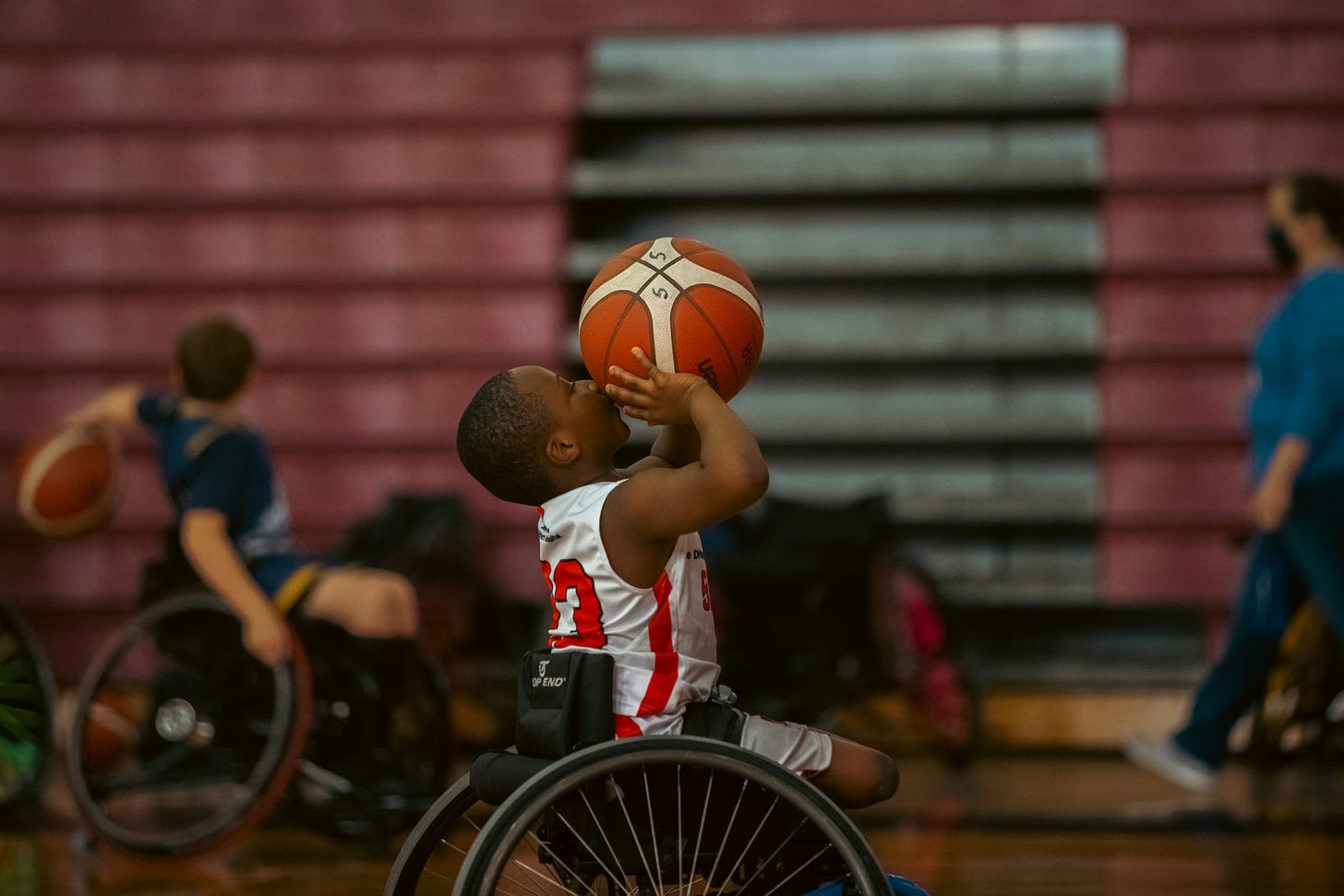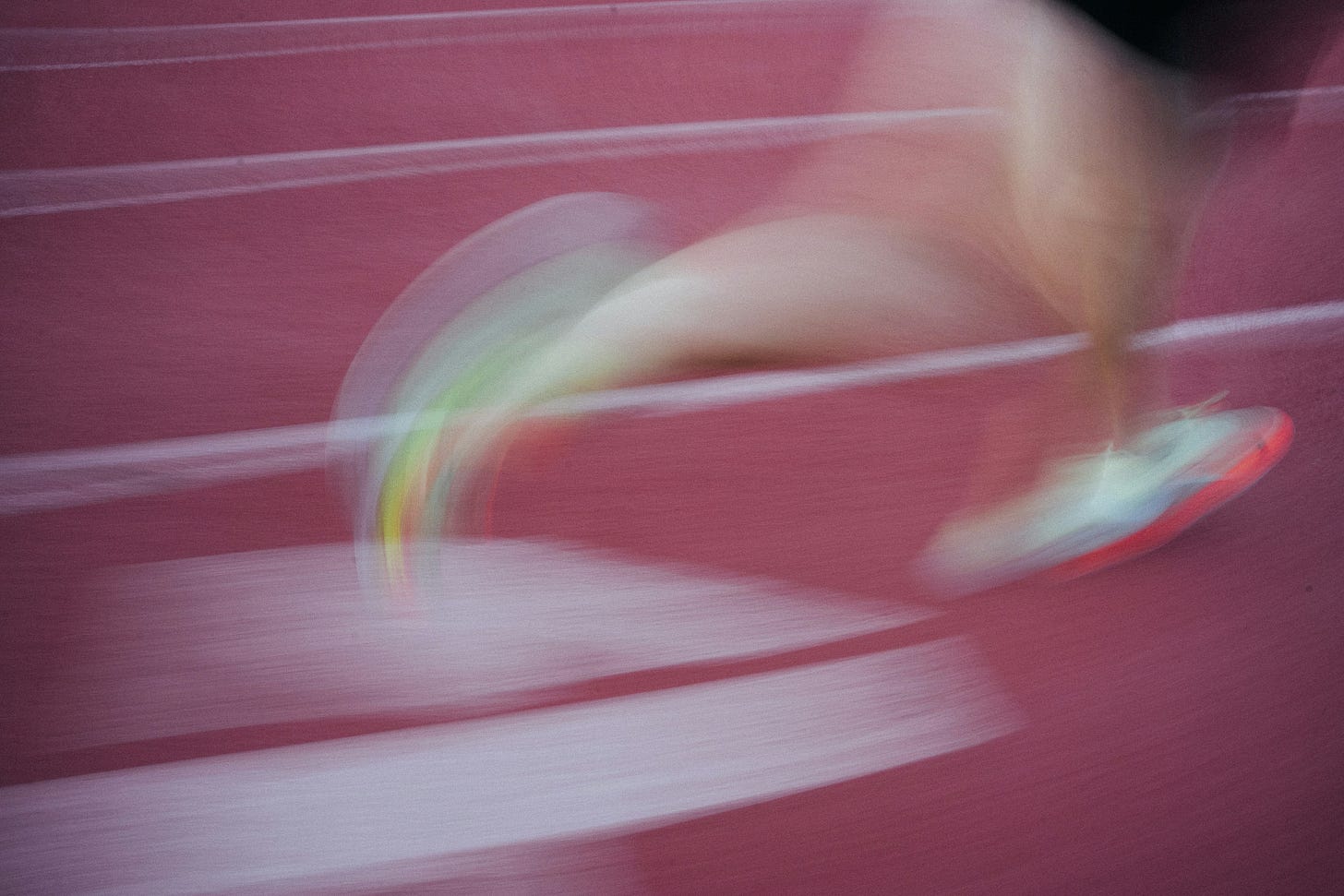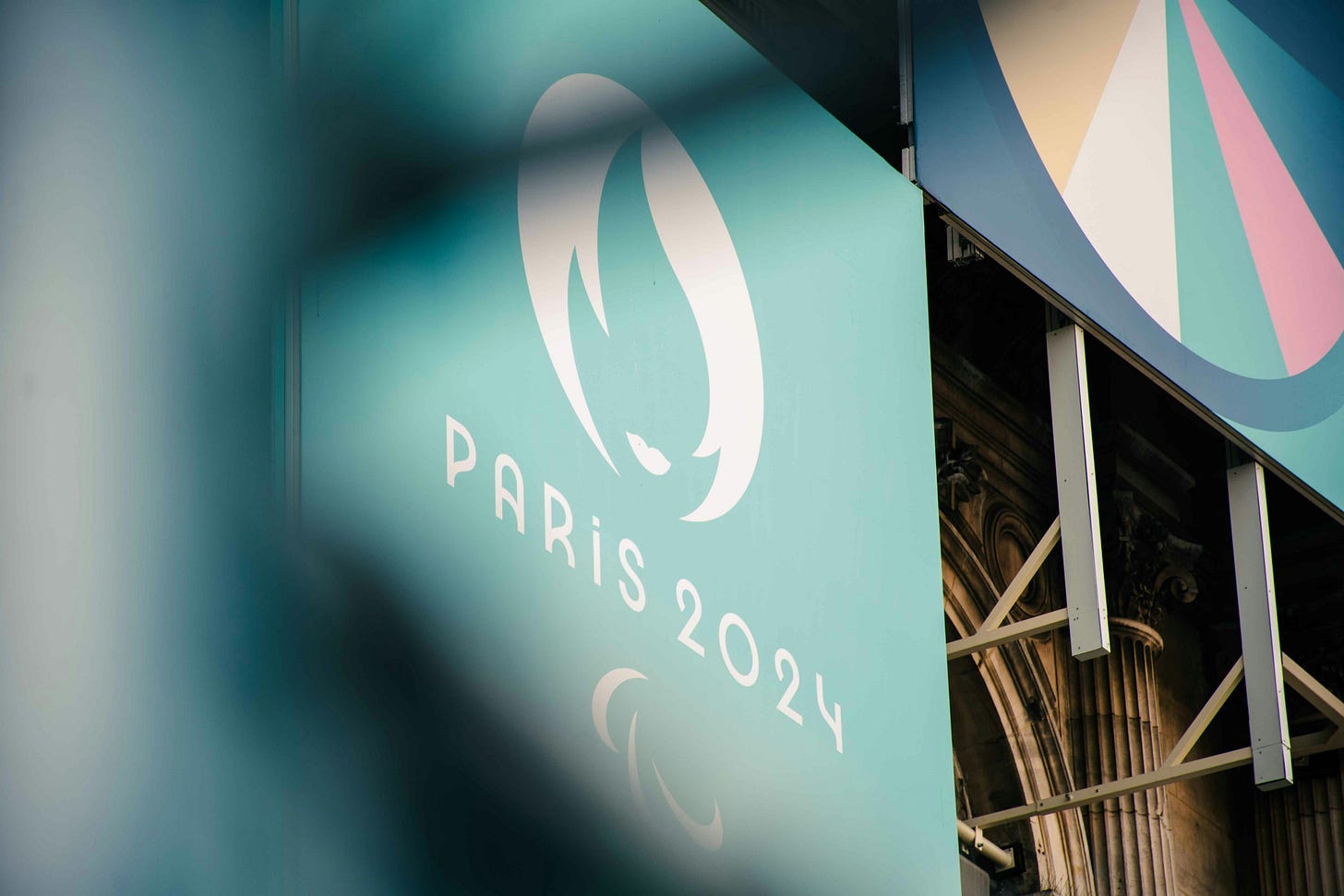Sparking a revolution of inclusion
#13: A visionary neurologist, remarkable comebacks, friendly horses, therapy dogs, and the hidden world of Paralympic guides...

Tales from the fringes of sport and society…
It was 76 years ago this summer that neurologist Ludwig Guttmann came up with a bold idea for rehabilitating his paralysed patients at the Stoke Mandeville Hospital.
On the same day as the opening ceremony for the 1948 London Olympic Games, Guttmann organised a sporting event for 16 injured British servicemen, encouraging them to take part in wheelchair archery.
Guttmann was Jewish and fled the Nazi regime in 1939, but as a German treating soldiers with life-changing injuries following combat against his homeland, it was likely that he faced additional resistance to his unconventional ideas. But the doctor insisted on focusing his patients' minds on what they could do, rather than lamenting what they no longer could.
The Stoke Mandeville Games became an annual tradition that would soon attract international entrants. "I dream of the day when there will be Olympic Games for people with disabilities," said Guttmann of his pioneering programme.
As the 17th summer Paralympic Games began this week in Paris, it’s clear that his vision has been realised. The slick opening ceremony on Wednesday was a visual spectacle that - not for the first time this summer - put forward a strong case for the French capital to be considered the most iconic city on the planet.
But what proved more striking than the architecture, the fireworks, or even the performances, were the human stories told throughout the evening. These were not athletes sharing their experiences. After all, their stories will come. Instead, the video anecdotes were from regular “civilians” who spoke articulately and powerfully about living with their disabilities.
Lucia Retail described how she kisses her children more often because she has no hands to touch them with, Molly Burke explained how people didn't talk to her because they feared saying the wrong thing about her blindness, and Lil Skuna joked in his wheelchair, "One day I wake up in the morning and I tell myself, 'Ok I'm going to walk!'. No, no, no, that's only in movies. I tried, I fell." He was making clear that the feel-good triumphs we’re about to witness over the next 11 days are far from typical of the daily lived experiences of disabled people.
Channel 4 has done plenty of good work in championing the Paralympics since it began covering the event 12 years ago, but it’s interesting to note how their tone has changed over the years. For London in 2012 and in Rio four years later, their campaigns lauded the athletes as “superhuman” for overcoming their disabilities to achieve athletic success. Widely lauded in the mainstream press at the time, it’s now seen by many as something of a misstep for focusing on athletes’ impairments, rather than their sporting prowess. Note that in the adverts for Paris 2024, the athletes must overcome gravity, friction, and time. Not their own bodies.
In much the same way that the refugee team at the Olympics wanted to be seen as athletes rather than symbols, the same can be said of those competing at the Paralympics. They are in Paris to win and put on a sporting show. They don’t want to be sentimentalised or patronised, they just want to be seen for what they are: great athletes producing great sport. And they’ll send that message from the track, the pool, or the velodrome.
However, the Paralympics can still prompt a wider conversation about disability in society. Which is why it was a welcome choice to give the floor to non-athletes at the opening ceremony. Those who don’t see the benefits of elite sport nor enjoy the privilege of global acclaim have more reasons for their voices to be heard.
Another clip saw Martin Petit, quadriplegic as the result of an accident seven years ago, note that "Inclusivity for the disabled is inclusivity for all". Then Paralympics President Andrew Parsons stood on the spot where, 200 years earlier, the French royal family were executed. Echoing the poignant video messages, Parsons called for the Games to prompt a societal rethink.
“The Paris 2024 Paralympic Games will show what persons with disabilities can achieve at the highest level when the barriers to succeed are removed. The fact these opportunities largely exist only in sport in the year 2024 is shocking. It is proof we can and must do more to advance disability inclusion – whether on the field of play, in the classroom, concert hall or in the boardroom.
That is why 225 years on from when Place de la Concorde was central to the French Revolution, I hope the Paris 2024 Paralympic Games spark an inclusion revolution."
Just two days before the opening ceremony, Tanni Grey-Thompson, justifiably considered one of Britain’s most influential sportspeople, had to drag herself off an LNER train in London due to a lack of support staff. A champion on the track, but a second thought off it.
It proved a timely reminder that lauding these formidable athletes every four years is not enough to ensure people with disabilities feel included in society. To be viewed as equals, not nuisances. Over the decades, Dr. Guttmann’s Paralympic Games have proven to be a revelation. Now it’s time for them to spark a revolution.
Enjoy this month’s picks. If you do, please consider sharing it with a pal who might like it, too.

Eyes on the prize: The hidden world of Paralympic guides
It’s another new outing for Unsung, hot on the heels of our well-received episode on Olympic refugees which (humblebrag incoming) was selected as one of The Guardian’s podcasts of the week. This time around, we’re looking at para sport guides.
I’ll admit that I was a little hesitant about making able-bodied participants the focal point of a podcast about para sports during the Paralympic Games. On the face of it, there was always the risk of misjudging the tone at a time when the nation is rightly praising its latest medal-winners. But, given what I wrote in the intro about avoiding patronising disabled people, I concluded that there was a story to be told about the unique relationship between athlete and guide. What’s more, it’s one the athletes themselves want to tell.
Athletes like James Ledger, the T11 sprinter and British record holder who was not only happy to praise the important role of guides, but felt it absolutely necessary to spread the word so that future visually impaired athletes like him don’t miss out on the opportunities he’s enjoyed. Along with James and his guide Greg Kelly, the episode features Ben Hoffman, the Ironman titan who is now guiding Owen Cravens as the American pair bid for a medal in the para triathlon in Paris.
Refugee boxer makes history at Paris 2024
As well as interviews with badminton player Dorsa Yavarivafa and swimmer Matin Balsini, the last episode of Unsung gave a mention to each British-based member of the Olympic Refugee Team. The script for Cindy Ngamba read, “Given her success in British boxing rings, there are genuine hopes that she can become the first refugee to win an Olympic medal.”
Miraculously, given my sporting predictions are usually only appreciated by cackling bookmakers, that’s exactly what happened: Ngamba made history following two boxing victories in Paris that led to her returning to the UK with a bronze medal around her neck.
It prompted Philanthropy Age to get in touch to ask if I fancied writing about Ngamba’s success, which I was only happy to do.

Paralysed by an ex-boyfriend, Otto rises as Paralympian
In October 2019, Tracy Otto was attacked at her home by her ex-boyfriend. She was left paralysed from the chest down with limited use of her arms and hands, and lost her left eye. She is no longer able to sweat or regulate her body temperature properly. Five years later she is still re-learning how her body works. Remarkably, she is also lining up in Paris representing the USA in archery, with an adapted harness that allows her to release arrows with her mouth, as delicately told by the BBC's Emma Smith and Caroline Barker.
Otto is very frank about what happened to her, and the struggles she faces in everyday life. But the Floridian is a vibrant and unabashed character who refuses to be cowed by the man who tried to take everything from her.
"I've had this feeling that there is a bigger picture about this situation," she says.
"I have always wanted to leave an impact on this world, and be a light. There is so much darkness and hate, I can't justify not talking about and being an example for people hurt like me.”
How Paralympic swimmer Ali Truwit recovered from a shark attack
In another jaw-dropping tale of sporting prowess helping to alleviate desperate circumstances, this excellent ESPN article by Aishwarya Kumar profiles Ali Truwit, the swimmer who lost her leg following a harrowing shark attack. Occurring only two days after graduating from Yale and just a week after she completed a marathon, Truwit's life was turned upside down in the Caribbean Sea. That she is back in the water swimming for her country in Paris is stunning in itself, but barely believable when you discover that the incident in question happened just over a year ago.
The role of “friendly horses” at the Paris Paralympics
In what is a debut Off-Field appearance for the legendary publication Horse & Hound, this article from Oscar Williams uncovers the unseen and unsung heroes of para dressage: companion horses. Known in the sport as "friendly horses", they've been used at the Paralympics since the sport’s debut at Atlanta 1996, and their presence helps to keep the competing horse calm, and the rider safe, in what can prove daunting arenas for both.
The unsung hero of the Olympic-champion US women’s gymnastics team is a very good boy
In another story that proves what many of us have long come to accept - that animals are life's good guys - The Guardian's Lauren Mechling reveals that the all-conquering American gymnastics team owed a debt of gratitude to Beacon, a four-year-old golden retriever who formed part of the squad for the past year. The emotional support dog was recruited to keep the gymnasts' serotonin and stress levels in check and, with eight medals in total for Simone Biles and co in Paris, he did a sterling job indeed.
With his fluffy butterscotch coat, eyes as soulful as Leonard Cohen and the official credential that hangs around his neck and reads “Goodest Boy”, Beacon has earned celebrity standing in both gymnastic and dog-loving circles. “This dog has touched Simone Biles” is how a starstruck TikTok about him jumps into action. None other than Tokyo Olympic all-around champion Suni Lee, whose journey to the starting line in Paris was anything but straightforward, posted a picture of herself with the shiny-nosed pooch from the trials. “Thank god for Beacon,” read her caption, helping launch him to stardom.
How the Sports Bra kicked off a women’s sports movement
Jenny Nguyen knew she was on to something when her Kickstarter campaign was fully funded within nine days. That something was a sports bar that only showed women's sports. Opened in Portland in April 2022, “the Bra” smashed through $1 million in revenue in just eight months and has since inspired the launch of similar bars in nine cities around the US. Chabeli Carrazana for the 19th describes a positively burgeoning scene.
The Indigenous roots of a revived Olympic sport
When the Paralympics close in a little over a week’s time, bringing an end to an epic sporting summer, a gradual shift will begin. With memories made and stamped in Paris, the focus will move towards the next Olympic and Paralympic hosts, Los Angeles.
There are several new additions to the sporting schedule in LA, among them Lacrosse, one of the fastest-growing sports in America. The sport is believed to have been invented around 1,000 years ago by the Haudenosaunee people – the confederacy made up of the Mohawk, Onondaga, Oneida, Cayuga, Seneca, and Tuscarora nations of north-eastern North America. But, as this article from Karen Gardiner explains, there are fears that the sport's Indigenous founders may be left out of the party in four years time.
Murderball: Head to head with Australia's toughest team, Will Swanton
“Dubberley's memories of this day are vivid. Black and white photographs taken without his permission. The raw sting of acidic water spearing through his eyes. Snap. The disbelief at being one missed heartbeat away from dying in what amounted to little more than a puddle. Snap. Such a piss-weak and unthreatening body of water, teasing him and mocking him in the after-wash of his own lame fall. Snap. The incredulity upon realising that no matter how desperately the millions and billions and trillions of interconnected neurones in his distinctly unparalysed brain were howling at his arms and legs to get a wriggle on, they were capable of doing no such thing. Snap."
If you've watched any of the wheelchair rugby at this year's Paralympic Games, you'll realise why it earns its nickname Murderball. The rules are simple: players aim to carry the ball across the goal line. But everything leading up to that? Carnage. Those players sit in reinforced steel wheelchairs and are seemingly allowed to do anything within their grasp to stop their rivals from scoring. It’s a high-octane smash-em-up encounter where the prevailing attitude can be summed up by one player's view, "What have we got to lose? It's not like we're going to break our necks again."
Swanton has a ferocious and uncompromising writing style that won’t be to everyone’s taste but he’s an Aussie who doesn’t pull any punches and he certainly can’t be accused of over-sentimentalising the topic. His 2009 book profiles the Australian team and uncovers the individual stories behind each player’s ordeal and success.
Thanks for reading August’s Paralympic edition of Off-Field. If you enjoyed the read, why not share it with a friend who might also like it? If you want to get in touch with any recommendations, give me a shout via alexisnjames@gmail.com.
“I lost my leg aged five. Now I'm 1.9 seconds behind Usain Bolt.” - Jonnie Peacock












